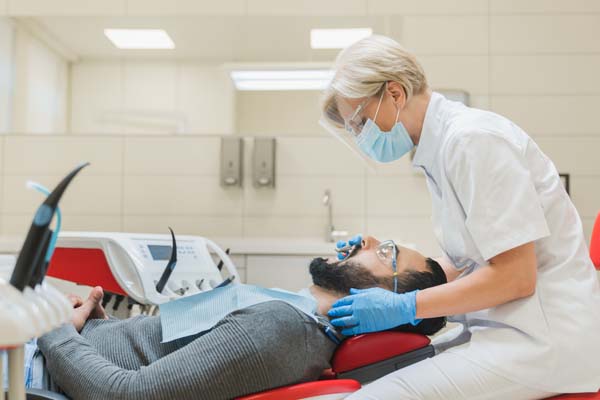How Does Root Canal Treatment Work?

Root canal treatment enables dentists to save infected, damaged, or decayed teeth. The procedure has a reputation as being painful, but this is far from the truth. Root canals were probably painful before the invention of local anesthetics, but now that is no longer the case. Local anesthetics are used during a root canal treatment, so patients do not feel significant pain as the dentist works on their tooth.
The root canal treatment process
Root canal therapy is usually suggested when a tooth’s pulp chamber has been damaged. The pulp chamber houses soft tissues like blood vessels and nerves, and it is sealed off from the rest of the tooth. Injury to a tooth can open this area, leaving these soft tissues susceptible to the bacteria and acids in the mouth. The risk of infection also goes up dramatically when a tooth’s pulp chamber is damaged.
Restoring a tooth with root canal therapy starts with the dentist evaluating the patient to see if it is the correct course of action. A visual examination is often performed, and diagnostics like X-rays might be used to assess what is going on inside a tooth.
Once it has been determined that root canal therapy is the appropriate treatment for the patient, the dentist will start the procedure by injecting the patient with a local anesthetic. This numbs the area being worked on so the patient does not feel pain as the dentist works. They will only feel the force of the dentist pushing and drilling into the tooth.
A dental drill is used to make a hole into the pulp chamber so the dentist can extract the soft tissue there with dental files. Medication might be inserted into the pulp chamber once the area has been thoroughly cleaned.
Depending on the severity of the infection in the tooth, the dentist might opt to reseal the tooth immediately or cover it with a temporary filling so they can insert another round of medication into the tooth in a week.
If the dentist thinks that one round of medication is enough for the tooth, a rubbery material called gutta-percha is used to close the tooth. The tooth can then be rebuilt using composite bonding, or a crown might be placed on it to complete the process.
Recovering after getting a root canal
There is no recovery period after having a root canal. The pain that brought the patient to the clinic is typically gone by the time the procedure is over. After getting a root canal, some patients might experience minor discomfort for the first few days. Over-the-counter medication can be used to address it. Patients are free to return to their regular routine after root canal therapy. Teeth repaired with root canal therapy will not be as strong as they once were, which is why dentists often recommend covering them with crowns to protect them against bite forces.
Save your damaged tooth
Root canal therapy can save your severely damaged or infected tooth. Call or stop by our Ventura clinic to set up an appointment with our dentist.
Request an appointment here: https://www.brightonspecialtydental.com or call Brighton Specialty Dental Group at (805) 644-5284 for an appointment in our Ventura office.
Check out what others are saying about our dental services on Yelp: Root Canal Treatment in Ventura, CA.
Related Posts
A prosthodontist is a dental specialist who focuses on restoring and replacing teeth to improve oral function, health, and aesthetics. While a general dentist can handle many common dental health and cosmetic issues, a prosthodontist is an expert in restoring a smile's form and function. Understanding their unique training and knowledge offers insight into when…
Are you looking for information on gum grafting? Even if you are not currently experiencing any gum-related problems, you may experience them in the future, so knowing about this procedure is a good idea. Your gums play a very important role in your overall dental health, as they help to protect the roots of your…
If you have ever had a dental crown placed, you know that the process often involves multiple visits and temporary crowns. A CEREC dentist offers a faster solution to the typical dental crown process. Using advanced technology, these dentists create durable, high-quality crowns in just one appointment.A CEREC dentist uses Computer-Aided Design and Manufacturing (CAD/CAM)…
If you have ever had a dental crown placed, you know that the process often involves multiple visits and temporary crowns. A CEREC dentist offers a faster solution to the typical dental crown process. Using advanced technology, these dentists create durable, high-quality crowns in just one appointment.A CEREC dentist uses Computer-Aided Design and Manufacturing (CAD/CAM)…
